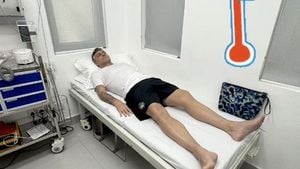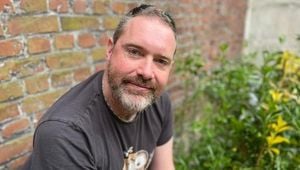Catherine Fournier, the Mayor of Longueuil, has launched a passionate plea for HPV vaccination, following the heartbreaking news of her close friend’s battle with cervical cancer. The vaccination, currently offered free of charge in Quebec, could have potentially saved her friend’s life, who is now facing imminent death.
“Never should anyone have to announce the imminent death of a young woman of 34. It’s even more true when we know this tragedy could have been avoided,” Fournier expressed on her Instagram, sharing the painful news. Her long-time collaborator and political advisor, Julie-Anne Cimon, received an advanced diagnosis of cervical cancer last year. Despite undergoing promising treatments, the cancer spread to her brain, leaving her with only days to live, as revealed by Fournier during her interview on the morning show Le Québec Matin on LCN.
Fournier underscored the significance of the HPV vaccine, stating, “The vaccination against HPV is key. [More than] 90% of cervical cancers in women are caused by these cursed viruses.” This sentiment echoes the serious public health concern surrounding HPV, which affects many individuals yet remains preventable through vaccination.
The mayor’s personal motives are evident; she desires to amplify her friend’s message. “Julie-Anne asked me to use my platform for awareness hoping her story would help prevent others,” Fournier stated, highlighting the urgency of her advocacy. Since sharing her plea, she has reportedly received numerous messages from individuals inspired to schedule their own vaccinations.
For those unaware, since 2008, HPV vaccination has been offered to girls starting from fourth grade and then again in ninth grade for those who missed the initial opportunity. Boys were included in the vaccination program starting from 2014. Fournier mentioned her own experience with the vaccination after learning of her friend’s condition, reflecting on how she and her friend represent the last generation who didn’t have access to such protection at school.
Currently, the vaccine is available for free to all men and women aged 21 to 45, but this initiative is temporary. It aims to utilize doses approaching their expiration date, ensuring they are not wasted. After this period, the free program will revert to focusing on youth aged 9 to 17. “A single injection provides protection for at least 11 years,” according to the Quebec Immunization Committee (CIQ).
Recent statistics from the World Health Organization (WHO) indicate some startling facts about HPV: 80% of sexually active individuals will contract at least one HPV infection during their lifetime, and it’s estimated 620 cases of cancer associated with HPV will be prevented annually through the extended vaccination program. Yet, the vaccine has faced resistance, with 20% of Quebec parents still hesitant to vaccinate their children.
The importance of advocacy cannot be overstated, especially when it stems from personal experience and loss. Fournier’s efforts are not just about promoting vaccination; they reflect the emotional toll of watching a friend suffer from something so preventable. Her determination to educate and mobilize her community stands as both a tribute to Cimon and a rallying call for greater awareness and action.
Her story resonates with many as she emphasizes the need for broader public engagement and proactive health measures. It raises questions about access, education, and the stigma still associated with vaccinations — especially vaccines targeting issues like HPV. Fournier’s advocacy serves not just as awareness but as hope — hope for preventing future tragedies like the one she now faces, and hope for all those who may still be vulnerable.
Fournier's poignant plea encourages individuals to take action, schedule their vaccinations, and share their own stories. It’s clear her goal is not only about changing minds but potentially saving lives. Equipped with information and urgency, her advocacy is poised to make waves and drive change within her community.



